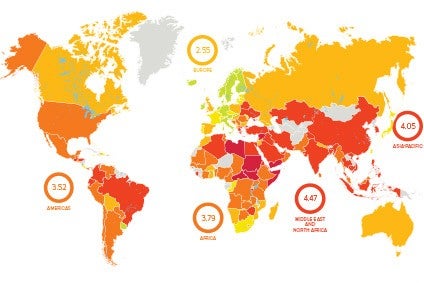
An annual survey of violations of human and trade union rights ranks key apparel-producing nations including Bangladesh, Cambodia, Colombia, Guatemala, the Philippines and Turkey among the ten worst countries in the world for worker rights.
The other countries also listed within the top ten are: Brazil, Kazakhstan, Saudi Arabia and Zimbabwe.
Ratings have also declined for Sri Lanka, Thailand and Vietnam, according to the International Trade Union Confederation (ITUC) in its latest Global Rights Index, with a rise in attacks on workers’ rights in law and practice. And “extreme violence against the defenders of workplace rights saw large scale arrests and detentions in India, Turkey and Vietnam.”
But year-on-year improvements have been seen in a number of countries, including key apparel suppliers Mauritius, Mexico and Pakistan.
The report asserts that the Middle East and North Africa was again the worst region for treatment of workers, with the kafala system continuing to exclude migrants, the overwhelming majority of the workforce, from any labour protection – leaving 90% of the workforce unable to access their rights to form or join a trade union.
Conditions in Asia-Pacific deteriorated more than any other region with an increase in violence, criminalisation of the right to strike and violent attacks on workers. Ten trade unionists were murdered in the Philippines in 2018.

US Tariffs are shifting - will you react or anticipate?
Don’t let policy changes catch you off guard. Stay proactive with real-time data and expert analysis.
By GlobalDataExamples specific to the apparel industry include “mass dismissals, arrests, violence and state repression against peaceful protests” by workers in Bangladesh. “In the garment sector, strikes were often met with extreme brutality by police forces,” the report says, citing wage protests early this year.
And in Myanmar, “dozens of garment workers employed at the Fu Yuen Garment Co Ltd, a textile factory, were seriously wounded after 40 armed thugs attacked the protesters with metal bars and wooden sticks. The police were called in but made no arrest.”
Meanwhile in Africa, workers were arrested or detained in 49% of countries. Attacks on workers reached unprecedented levels in Cameroon, Nigeria, Chad, Ghana, Eswatini and Zimbabwe as security forces fired live ammunition at protesting workers.
The Americas also remain plagued by “the pervasive climate of extreme violence and repression against workers and union members”; in Colombia alone, 34 trade unionists were murdered in 2018 – a dramatic rise from 15 in the previous year, the ITUC says.
And in Europe, workers were arrested and detained in 25% of countries. Trade union leaders were murdered in Turkey and Italy.
“From Hong Kong to Mauritania, the Philippines to Turkey, governments are attempting to silence the age of anger by constraining freedom of speech and assembly,” says ITUC general secretary Sharan Burrow. “In 72% of countries, workers had no or restricted access to justice, with severe cases reported in Cambodia, China, Iran and Zimbabwe.”
“The breakdown of the social contract between workers, governments and business has seen the number of countries which exclude workers from the right to establish or join a trade union increase from 92 in 2018 to 107 in 2019.
“The greatest increase took place in Europe where 50% of countries now exclude groups of workers from the law, up from 20% in 2018. Decent work is being affected and rights are being denied by companies avoiding rules and regulations.”
The ‘ITUC Global Rights Index 2019’ ranks 145 countries against 97 internationally recognised indicators to assess where workers’ rights are best protected in law and in practice.
The report’s key findings include:
- 85% of countries have violated the right to strike.
- 80% of countries deny some or all workers collective bargaining.
- The number of countries which exclude workers from the right to establish or join a trade union increased from 92 in 2018 to 107 in 2019.
- Workers had no or restricted access to justice in 72% of countries.
- The number of countries where workers are arrested and detained increased from 59 in 2018 to 64 in 2019.
- Out of 145 countries surveyed, 54 deny or constrain free speech and freedom of assembly.
- Authorities impeded the registration of unions in 59% of countries.
- Workers experienced violence in 52 countries.
- Trade unionists were murdered in ten countries – Bangladesh, Brazil, Colombia, Guatemala, Honduras, Italy, Pakistan, the Philippines, Turkey and Zimbabwe.
The Global Rights Index 2019 numbers have also been added to the Countries page on the re:source by just-style strategic sourcing tool, making it easy to rank and compare countries using this key metric. Furthermore, the numbers can be easily downloaded to Excel.



